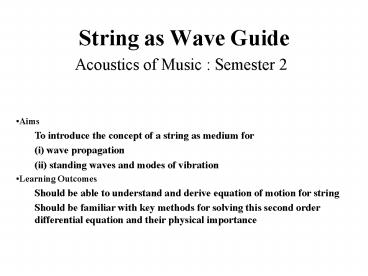String as Wave Guide
1 / 22
Title: String as Wave Guide
1
String as Wave Guide
Acoustics of Music Semester 2
- Aims
- To introduce the concept of a string as medium
for - (i) wave propagation
- (ii) standing waves and modes of vibration
- Learning Outcomes
- Should be able to understand and derive equation
of motion for string - Should be familiar with key methods for solving
this second order differential equation and their
physical importance
2
Review of Last Week
We studied a string as two springs
- Discussed scenarios
- No tension
- Constant tension T
- Tension from extending springs of free length x0
To show linear and non linear behaviours
depending on tension and displacement - hence how
this relates to musical expression
linear
non-linear
3
Consider Stretched String
- Assumptions
- uniform linear density
- negligible bending stiffness
- constant tension
- T large enough to rule out effects of gravity
- no dissipative forces
- small angles
4
Consider Stiffness and InertiaLets get equation
of motion Fma
Net vertical tension
Mass per unit length
Mass of section of string
Assuming small angles
Hence
5
For infinitesimally small section
Hence
Gives wave equation
6
Wave Equation
- Were assuming tension and mass per unit length
constant and hence the speed of wave constant
7
Solving
- D'alemberts solution
Method of separation of variables
(Bernoulli)
8
Some math revision (chain rule)
- If
- Then
9
D'Alembert Method
- Introduce new variables u and v
- Hence we assume a solution of the form.
- yf(u(x,t),v(x,t))
- Essentially we need to differentiate to
substitute in wave equation
10
- Consider
- Consider
11
- Second Derivatives
- Similarly
12
- Hence our wave equation
- Becomes
- Which simplifies to
13
Can write wave equation as
i.e. a constant with respect to u
Integrate with respect to u gives
Integrating again
In other words yarbitrary functions
D'Alemberts Solution
i.e.
14
Travelling Waves
- two travelling waves going from left to right and
right to left - At a fixed end, say...
- Reflection at boundaries
15
Method of separation of variables
Starting with assumed solution
Partial Differentiation
Substituting both into Wave Equation
Gives
16
Collecting terms
Since left depends on t only, and right depends
on x only, their common value must be a constant.
hence
17
Lets write
as
Hence
This gives standard solution
where C and D constants
Similarly
gives solution
where A and B are constants
18
Solution to Wave Equation(Bernoulli - Separation
of Variables)
What does this tell us?
19
Apply boundary conditions
String fixed at bridge and neck.
y(0,t)0
y(L,t)0
f(t) does care what x is so can remove f(t)
20
Characteristic (Eigen) Values
Boundary Conditions
Only satisfied if C0 because of cos1 if x0.
If D0 no vibration
Consider
However equation satisfied if
Hence discrete set of frequencies
21
Modes of Vibration
Collectively
oscillation term
restrictor
22
Natural Frequencies of a String

























![Guide To Recording [Acoustic Guitars Part 1]](https://s3.amazonaws.com/images.powershow.com/6877229.th0.jpg?_=20190314018)





